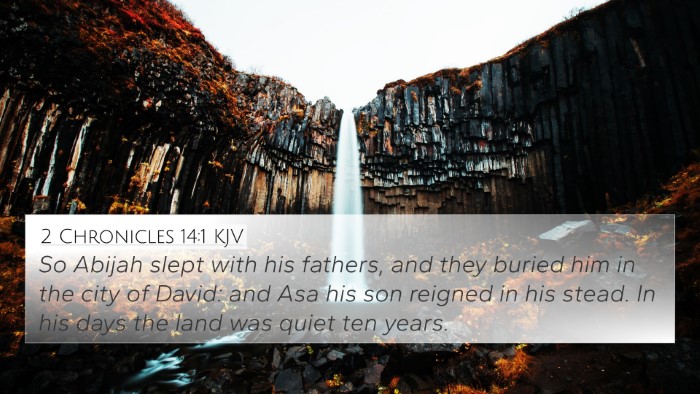Understanding 1 Kings 15:8
Verse: 1 Kings 15:8 - "And Abijam slept with his fathers; and they buried him in the city of David: and Asa his son reigned in his stead."
Overview
This verse marks a transitional moment in the history of Israel's monarchy, specifically reflecting on the reign of Abijam, the son of Rehoboam. Abijam's death sets the stage for Asa's ascension to the throne, representing a critical point in the narrative of the southern kingdom of Judah.
Commentary Insights
-
Matthew Henry:
Henry emphasizes the brevity of Abijam’s reign and highlights the moral implications of his leadership. He notes that Abijam's tenure was marked by continued division and the sins inherited from his forefathers, indirectly influencing the spiritual condition of Israel.
-
Albert Barnes:
Barnes reflects on the lineage aspect of the monarchy, underscoring Asa's emergence as a king meant to restore proper worship and governance. He sees Asa's reign as a stark contrast to Abijam’s failure, suggesting a divine intention to guide Israel to a righteous path.
-
Adam Clarke:
Clarke provides a historical context by noting the significance of Abijam being buried in the city of David, which speaks not only to his lineage but also to God's covenant with David. Asa's rise indicates the continuing legacy of David’s line, which plays a crucial role in biblical history.
Biblical Cross-References
This verse connects with several important biblical themes and other scriptures:
- 2 Chronicles 13:1-22 - Details the military conflict during Abijam's reign and his appeal to David's legacy.
- 1 Kings 14:31 - Describes Rehoboam's life and hint at Abijam's characteristics as a ruler.
- 1 Kings 15:9 - Asa's accession to the throne is highlighted here; his reforms are critical in subsequent narratives.
- 2 Chronicles 14:1-7 - Chronicles Asa's efforts to reform Israel’s worship and end idolatry.
- 1 Kings 12:15 - Sets the stage for the divided kingdom and the challenges that subsequent kings like Abijam faced.
- 2 Kings 14:29 - References the continuity of the Davidic line amidst the geopolitical struggles of the era.
- Jeremiah 22:1-5 - Speaks to the expectations of leadership from the descendants of David, tying in Asa’s reforms.
Interconnected Themes
1 Kings 15:8 acts as a turning point in the theme of leadership and divine justice. It invites readers to explore:
- **Legacy of Leadership** – The significance of having a righteous king versus one who perpetuates sin.
- **Covenant Promises** – The implications of God's covenant with David continuing through Asa.
- **Judgment and Restoration** – How God may utilize imperfect leaders to bring about His purposes.
Thematic Connections
This verse is closely linked with other passages that delineate the importance of godly leadership and covenant fidelity:
- Psalm 78:70-72 - Reflects on David’s qualities as a shepherd and leader, vital to understanding the continual expectation of kings.
- Isaiah 9:6-7 - Mesopotamian connections to David's eternal kingdom serve to deepen the understanding of authority.
- Ezekiel 34:23-24 - Highlights God's promise to appoint a shepherd from David's line, contrasting Abijam and Asa's reigns.
Using Cross-References in Study
For developing a deeper comprehension of 1 Kings 15:8, employing tools for Bible cross-referencing is essential:
- Utilize a Bible concordance to trace themes and names throughout the scriptures.
- Employ a cross-reference guide to find parallels between kings in divided Israel and Jeroboam’s influence.
- Apply cross-referencing Bible study methods for thematic analysis of leadership traits within the scriptures.
Conclusion
In summary, 1 Kings 15:8 is not just a moment in the timeline of Israel's kings but a profound indicator of divine oversight and the importance of righteous leadership, with crucial implications for Israel’s spiritual trajectory. The connections drawn in this analysis underline its significance as part of the larger biblical narrative, revealing thematic ties and the deep interplay of God's promises and human agency across the scriptures.







